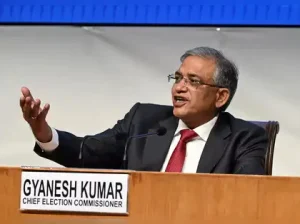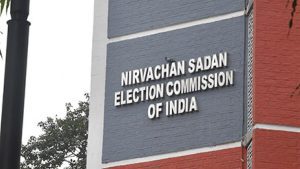India– The Election Commission is preparing to launch the most comprehensive electoral roll revision in over two decades, with the Special Intensive Revision (SIR) set to transform India’s voter registration landscape. This ambitious Election Commission SIR initiative represents a fundamental shift from routine electoral roll maintenance to a complete reconstruction of the country’s voter database.
The Election Commission has convened a crucial conference of Chief Electoral Officers (CEOs) from all states and Union Territories on September 10, 2025, marking a pivotal moment in the Election Commission SIR rollout strategy. This high-level meeting at the India International Institute of Democracy and Election Management (IIIDEM) in Dwarka will serve as the operational foundation for the nationwide implementation.
 During this conference, CEOs will present comprehensive data regarding their respective jurisdictions, including current elector numbers and details from previous intensive revisions. The Election Commission leadership, comprising Chief Election Commissioner Gyanesh Kumar and Election Commissioners Sukhbir Singh Sandhu and Vivek Joshi, will evaluate state-wise preparedness for the Election Commission SIR implementation.
During this conference, CEOs will present comprehensive data regarding their respective jurisdictions, including current elector numbers and details from previous intensive revisions. The Election Commission leadership, comprising Chief Election Commissioner Gyanesh Kumar and Election Commissioners Sukhbir Singh Sandhu and Vivek Joshi, will evaluate state-wise preparedness for the Election Commission SIR implementation.
The Election Commission has strategically chosen January 1, 2026, as the qualifying date for the nationwide Election Commission SIR. This date will serve as the benchmark for determining voter eligibility across the country, ensuring uniformity in the revision process. The selection of this specific date reflects careful consideration of administrative logistics and the need for synchronised implementation across India’s diverse electoral landscape.
The Election Commission SIR was initially piloted in Bihar, providing valuable insights for the nationwide rollout. This strategic decision to begin with Bihar allowed the Election Commission to test operational procedures, identify potential challenges, and refine implementation strategies before expanding across the country.
In Bihar, the revision process has progressed through multiple phases, including enumeration, claims and objections, and is now approaching completion with Electoral Registration Officers processing final submissions. The Bihar experience has established important precedents for document verification procedures and administrative workflows that will inform the national Election Commission SIR implementation.


Also Read: Election Commission SIR Details
The SC demands an urgent EC explanation.
The Election Commission SIR addresses critical issues, including duplicate entries, outdated registrations, and incomplete voter information that have accumulated over more than two decades. These problems have been exacerbated by migration patterns that often leave voters registered in multiple locations or fail to reflect their current residential status.
Unlike routine annual revisions that primarily involve additions and deletions to existing rolls, the Election Commission SIR employs a completely fresh approach. This comprehensive methodology involves creating entirely new electoral rolls rather than modifying existing ones, ensuring greater accuracy and eliminating historical discrepancies.
The process requires all voters to resubmit their information through new enumeration forms and declarations. For voters registered after 2003, additional documentation requirements apply, creating a more rigorous verification framework than previous revision cycles.
The Election Commission SIR has established a specific list of eleven eligibility documents for voter verification. This comprehensive documentation framework aims to ensure robust identity verification while maintaining accessibility for legitimate voters. The document requirements represent a balance between security concerns and practical accessibility for India’s diverse population.
Notably, commonly held documents such as Aadhaar cards, ration cards, and the Election Commission’s own Voter ID cards are not included in the approved list, creating some controversy regarding document accessibility and verification practicality.
The Election Commission SIR faces significant legal scrutiny through multiple petitions currently pending before the Supreme Court. These challenges question both the Election Commission’s authority to conduct citizenship verification and the rationale behind the specific document requirements.
Petitioners have raised concerns about the exclusion of widely-held identity documents and the potential barriers this might create for legitimate voters. The legal proceedings highlight the complex balance between electoral integrity and voter accessibility that the Election Commission SIR must navigate.
 The Election Commission is developing detailed timelines for the nationwide Election Commission SIR implementation, with specific schedules to be announced following the September 10 conference. The phased approach allows for systematic rollout while managing administrative capacity across different states and Union Territories.
The Election Commission is developing detailed timelines for the nationwide Election Commission SIR implementation, with specific schedules to be announced following the September 10 conference. The phased approach allows for systematic rollout while managing administrative capacity across different states and Union Territories.
Bihar’s experience, with its September 30 deadline for final electoral roll publication, provides a template for timing expectations in other states. However, the scale of nationwide implementation will require careful coordination to ensure adequate resources and personnel availability.
The Election Commission SIR will significantly impact future electoral processes by providing more accurate voter databases and reducing administrative complications during elections. This comprehensive revision addresses long-standing issues of voter roll accuracy that have affected election management and voter access.
The initiative represents the Election Commission’s commitment to modernising India’s electoral infrastructure and ensuring democratic participation remains accessible while maintaining system integrity. As the nationwide rollout approaches, the success of this ambitious undertaking will largely depend on effective coordination between central and state-level election machinery and continued legal clarity from ongoing Supreme Court proceedings.

